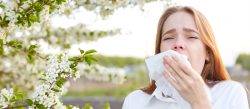Glossary of terms
Acute: Describes a disease or condition with a rapid onset, intense or severe symptoms and of brief duration. Allergen: Any…
Read MorePublished on May 23, 2022

A runny nose — also known as rhinorrhoea — is excess drainage produced by the nose and surrounding mucous membranes; it can be thin and clear or thick mucus. Nasal congestion is one of the most frequent symptoms of upper respiratory tract infections, allergies, sinus infections and nasal polyps.
When a cold virus or an allergen, such as pollen or dust, first enters the body, it irritates the lining of the nose and sinuses (air-filled pockets around the face), and the nose starts to make a lot of clear mucus. This mucus traps the cold virus or allergen and helps flush it out of the nose and sinuses.
You may experience a runny nose if you are allergic to certain substances and are exposed by touching, inhaling or ingesting them. Typical allergy triggers include dust mites, pollen, animal fur, fungal spores, grass and mould. Hayfever, also called allergic rhinitis, is a common type of allergic reaction. Hayfever usually occurs in spring and on windy days due to the excess pollen in the air.
If your runny nose is allergy-related, an over-the-counter antihistamine such as Telfast® may help to ease the symptoms. Other simple relief strategies can include gently blowing your nose, using a saline nasal spray or steam inhalation to open the airways.
If your runny nose is due to a cold, rest and fluids are key. For advice on treatment options for a runny nose, please consult your healthcare professional.
Always read the label and follow the directions for use.
Exposure to allergens such as pollen, dust mites, pet dander and mould can trigger a condition known as allergic conjunctivitis in some people, which causes various eye symptoms, including:
The best way to prevent an episode of allergic conjunctivitis from occurring is to avoid the substances that trigger your allergies.
If you are affected, there are several things you can do to help relieve your symptoms. These include:
While itchiness does suggest an allergic cause, similar symptoms may occur with other conditions like conjunctivitis or even the presence of a foreign body in the eye. Consult your GP or eye specialist for an accurate diagnosis and appropriate treatment plan.
Always read the label and follow the directions for use.
Learn about which Telfast product may be appropriate for you.
SEE THE PRODUCTS HEREMAT-AU-2102139. Nov 2021.

Acute: Describes a disease or condition with a rapid onset, intense or severe symptoms and of brief duration. Allergen: Any…
Read More
How do I manage my nasal allergies? Allergy symptoms can be overwhelming. When you’re feeling congested and miserable, it can…
Read More
What are antihistamines? Antihistamines are used by allergy sufferers to relieve allergy symptoms from seasonal and year-round allergies. What types of…
Read More